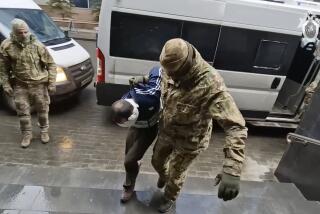The Real Power in Tajikistan
- Share via
KURGAN-TYUBE, Tajikistan — Gold-toothed Sangak Safarov has eight children and, at 65, is waiting for the birth of his ninth. He started late because he spent most of his adult life in prison.
And he has, by his own estimate, 8,000 fighters at his command, perhaps the decisive force in the civil warfare afflicting the former Soviet republic of Tajikistan.
Tajikistan has a government elected by its Parliament; it has an Interior Ministry and a Security Ministry and mayors. But the real power in Tajikistan, according to most accounts, is Safarov’s Tajik Popular Front.
“He arose with the people,” said one of the dozen Kalashnikov-toting young men who surrounded Safarov during a recent swing into the border town of Pyandzh. “He doesn’t need an official post.”
The prisons of the former Soviet Union have produced an intimidating new crop of leaders in the troubled south of the old empire.
In Tajikistan, the new interior minister once was convicted of racketeering, and Safarov spent 23 years in the penitentiary--five of them in solitary confinement--on a variety of charges that reportedly included car theft and murder.
When his followers refer to Safarov, they use the word for a great, revered leader-- vozhd-- that Russians used to apply to dictator Josef Stalin.
Safarov is also, according to opposition journalist Timur Klychev, “the biggest butcher in Tajikistan.”
Klychev said that Safarov had entered a village recently and sworn “to destroy all the men from Garm (an opposition stronghold) and make the women into slaves.”
While losing none of his ability to inspire fear, Safarov appears these days to be trying to make the transition from warlord to peacetime leader. When he emerged in Pyandzh from his motorcade of Soviet-made sedans--backed up by one Soviet-made armored personnel carrier--he was soon surrounded by tearful refugees begging for his help.
“The most important thing now is the refugees,” Safarov declared. “We must do everything to bring peace. Enough blood has been spilled.”
More to Read
Sign up for Essential California
The most important California stories and recommendations in your inbox every morning.
You may occasionally receive promotional content from the Los Angeles Times.












